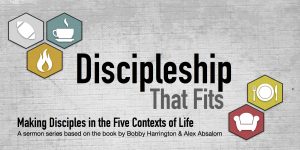Before we took a break for Christmas, we had been working our way through the book of Acts – and today we want to pick it up where we left off. However, since it’s been almost two months since we were looking at Acts, I suspect that we all probably need a bit of a refresher to remind us where we were and what we were talking about!
I won’t recap the entire book thus far – that would take up pretty much the entire sermon – but I’ll give you just a quick refresher of what the book is all about and then just a few brief reminders of what’s happened in the story most recently.
The book is traditionally called “The Acts of the Apostles” but we’ve repeatedly seen that it may be more accurate to call it “The Continued Acts of Jesus” or “The Acts of the Holy Spirit”. Of course, there are many different apostles and other key figures in throughout the book (such as Peter, James, Paul, & Barnabas), but the author Luke only includes them as secondary characters to the central storyline – and that storyline is the spread of the Gospel and the growth of Christ’s church.
The book begins primarily following the growth of the church among the Jewish communities in and around Jerusalem, but as the book has progressed, we’ve seen the Gospel spread out to include the Gentiles – both near and far! In fact, in these last few chapters of Acts, we’ve seen Paul complete the first missionary journey with Barnabas – starting churches throughout south Asia Minor.
And of course, this was exactly what Jesus had commanded the disciples to do. As we read in Acts 1:8, Jesus said…
8 “But you will receive power when the Holy Spirit comes upon you. And you will be my witnesses, telling people about me everywhere—in Jerusalem, throughout Judea, in Samaria, and to the ends of the earth.” Acts 1:8
This is exactly what we are seeing by this point in the story. The Good News of Jesus is being taken all over the world – and both Jews and Gentiles are becoming believers.
Mind you, the fact that the gentiles were becoming believers had become quite a point of contention among the Jews. For the longest time, the Jews had believed that salvation is for the Jews and for the Jews alone! And if a gentile wanted to come to God, then they had to become like a Jew first.
This became a major controversy in the church as more and more Gentiles became believers! The big question was: Did the gentiles have to become like the Jews and follow all the Jews laws like circumcision and Sabbaths and kosher foods? Or could they be saved by faith in Jesus Christ alone?
In the end, it was recognized that God had provided salvation for everyone the same way – and that is by faith in Jesus alone! Following the Jewish laws had no bearing whatsoever on Salvation! And so with that issue settled, the message of Jesus Christ continued to spread throughout the Gentile world.
Now when we last left off, Paul & Barnabas had just split up following their first missionary journey together. They had a significant disagreement over whether or not to take John Mark with them on a second journey – because John Mark had previously bailed on them halfway through their first mission’s trip!
Of course, as the Son of encouragement, Barnabas wanted to give John Mark another chance, but Paul wasn’t willing to risk the success of the mission to do that! And so the two men parted ways – Barnabas took John Mark and went to Cyprus, while Paul took Silas and traveled to Syria and Cilicia.
And so this is where we pick up the story today in Acts chapter 16 – as Paul & Silas begin Paul’s second missionary journey.
Leave a Comment
